University Nursing Assignment: Seclusion, Restraint, and Patient Care
VerifiedAdded on 2022/09/11
|10
|2698
|14
Essay
AI Summary
This essay critically examines the impact of seclusion and physical restraint on mental health consumers and healthcare professionals. It discusses the historical context of these practices, their psychological and physiological consequences, and ethical considerations. The essay explores the role of registered nurses in collaborating with consumers to reduce seclusion and restraint, highlighting the importance of effective communication and therapeutic relationships. It also references initiatives like Safewards Victoria, which aim to decrease conflict and improve staff-consumer relationships. The essay emphasizes the need for alternative strategies and a decision-making framework to minimize the use of restrictive practices, ultimately aiming to improve the quality of care and patient outcomes in mental health settings. The analysis draws on national and international perspectives and contemporary literature to support its arguments, and concludes that seclusion and restraint should be considered as a last resort in mental health nursing.
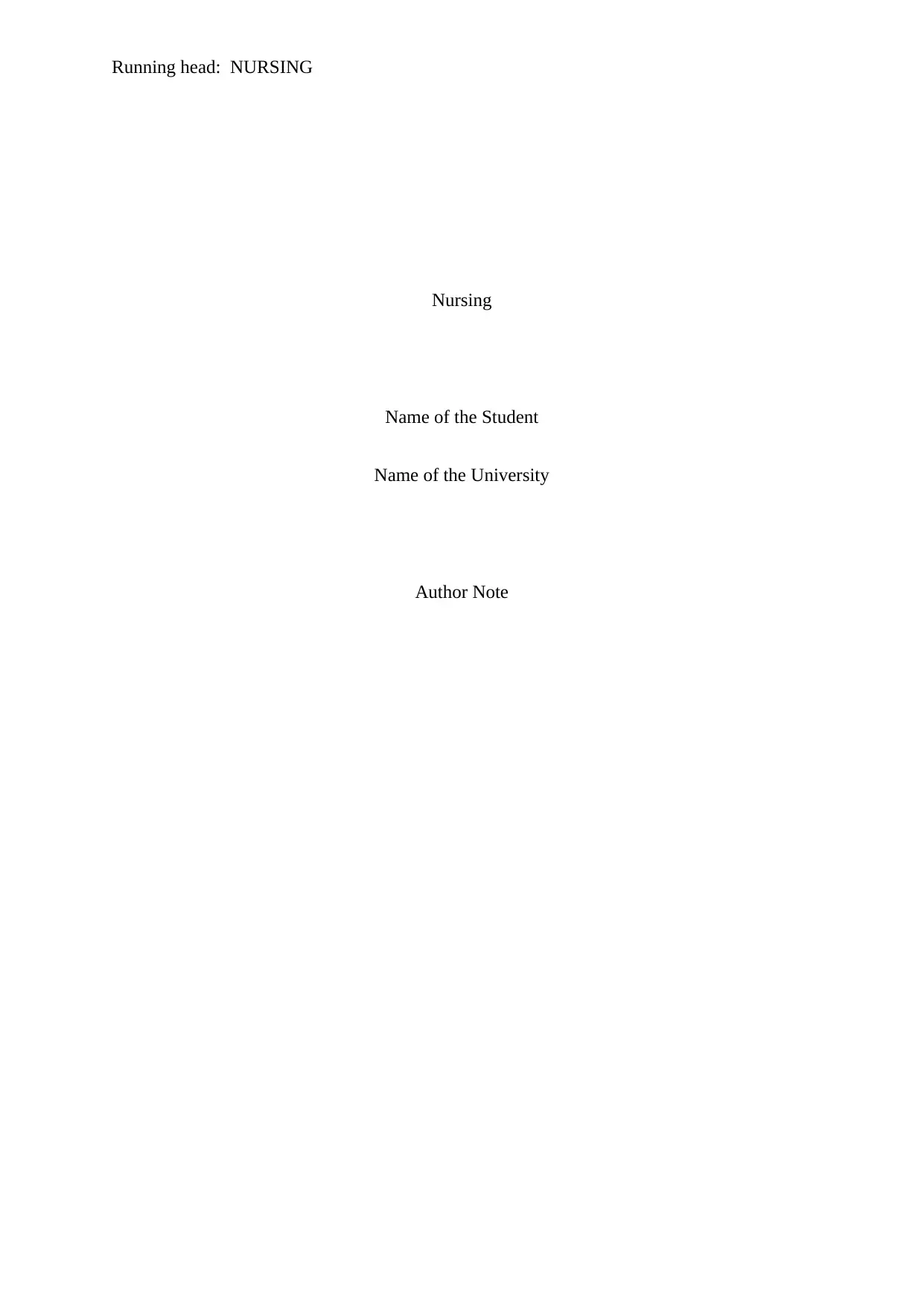
Running head: NURSING
Nursing
Name of the Student
Name of the University
Author Note
Nursing
Name of the Student
Name of the University
Author Note
Paraphrase This Document
Need a fresh take? Get an instant paraphrase of this document with our AI Paraphraser
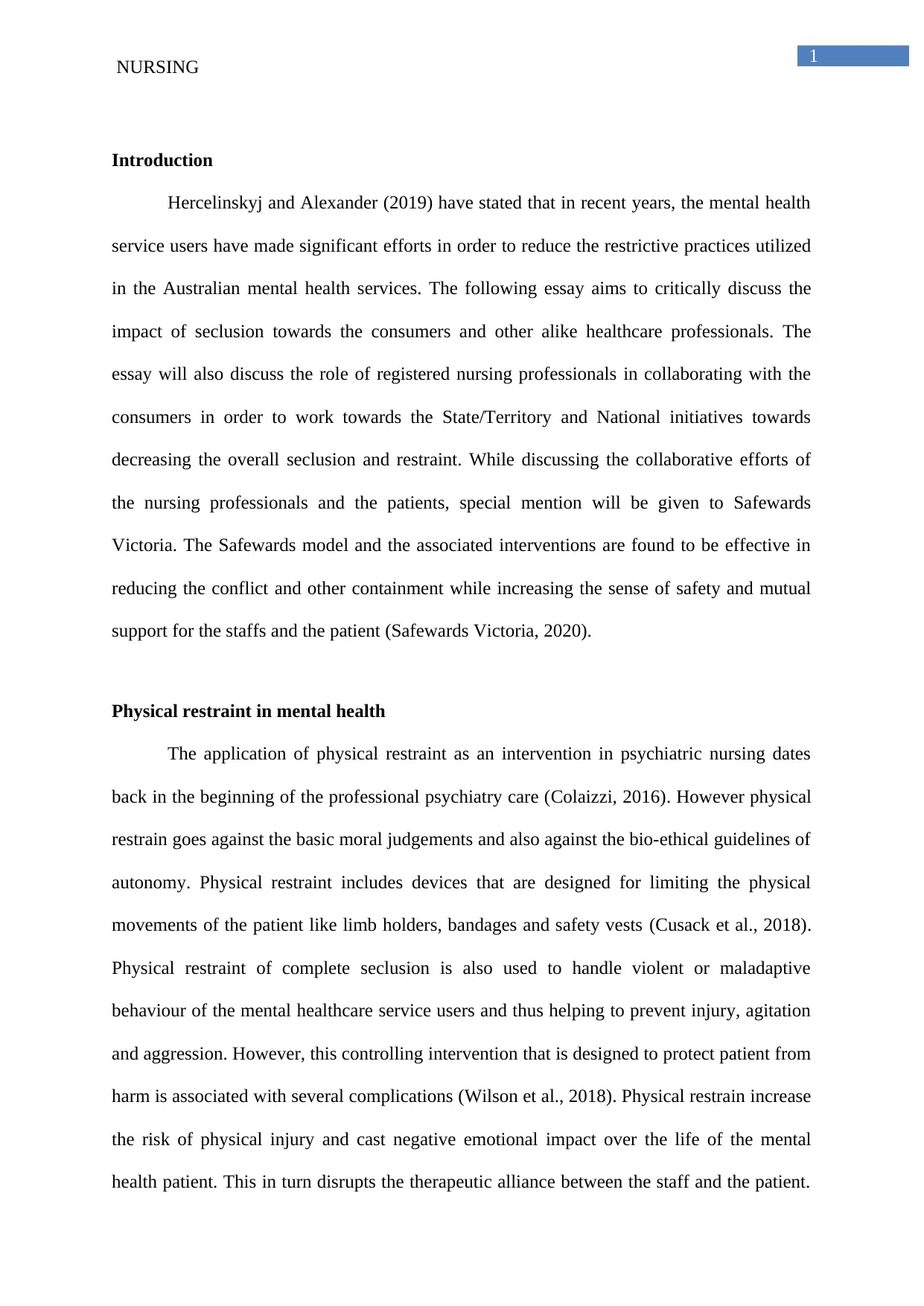
1
NURSING
Introduction
Hercelinskyj and Alexander (2019) have stated that in recent years, the mental health
service users have made significant efforts in order to reduce the restrictive practices utilized
in the Australian mental health services. The following essay aims to critically discuss the
impact of seclusion towards the consumers and other alike healthcare professionals. The
essay will also discuss the role of registered nursing professionals in collaborating with the
consumers in order to work towards the State/Territory and National initiatives towards
decreasing the overall seclusion and restraint. While discussing the collaborative efforts of
the nursing professionals and the patients, special mention will be given to Safewards
Victoria. The Safewards model and the associated interventions are found to be effective in
reducing the conflict and other containment while increasing the sense of safety and mutual
support for the staffs and the patient (Safewards Victoria, 2020).
Physical restraint in mental health
The application of physical restraint as an intervention in psychiatric nursing dates
back in the beginning of the professional psychiatry care (Colaizzi, 2016). However physical
restrain goes against the basic moral judgements and also against the bio-ethical guidelines of
autonomy. Physical restraint includes devices that are designed for limiting the physical
movements of the patient like limb holders, bandages and safety vests (Cusack et al., 2018).
Physical restraint of complete seclusion is also used to handle violent or maladaptive
behaviour of the mental healthcare service users and thus helping to prevent injury, agitation
and aggression. However, this controlling intervention that is designed to protect patient from
harm is associated with several complications (Wilson et al., 2018). Physical restrain increase
the risk of physical injury and cast negative emotional impact over the life of the mental
health patient. This in turn disrupts the therapeutic alliance between the staff and the patient.
NURSING
Introduction
Hercelinskyj and Alexander (2019) have stated that in recent years, the mental health
service users have made significant efforts in order to reduce the restrictive practices utilized
in the Australian mental health services. The following essay aims to critically discuss the
impact of seclusion towards the consumers and other alike healthcare professionals. The
essay will also discuss the role of registered nursing professionals in collaborating with the
consumers in order to work towards the State/Territory and National initiatives towards
decreasing the overall seclusion and restraint. While discussing the collaborative efforts of
the nursing professionals and the patients, special mention will be given to Safewards
Victoria. The Safewards model and the associated interventions are found to be effective in
reducing the conflict and other containment while increasing the sense of safety and mutual
support for the staffs and the patient (Safewards Victoria, 2020).
Physical restraint in mental health
The application of physical restraint as an intervention in psychiatric nursing dates
back in the beginning of the professional psychiatry care (Colaizzi, 2016). However physical
restrain goes against the basic moral judgements and also against the bio-ethical guidelines of
autonomy. Physical restraint includes devices that are designed for limiting the physical
movements of the patient like limb holders, bandages and safety vests (Cusack et al., 2018).
Physical restraint of complete seclusion is also used to handle violent or maladaptive
behaviour of the mental healthcare service users and thus helping to prevent injury, agitation
and aggression. However, this controlling intervention that is designed to protect patient from
harm is associated with several complications (Wilson et al., 2018). Physical restrain increase
the risk of physical injury and cast negative emotional impact over the life of the mental
health patient. This in turn disrupts the therapeutic alliance between the staff and the patient.
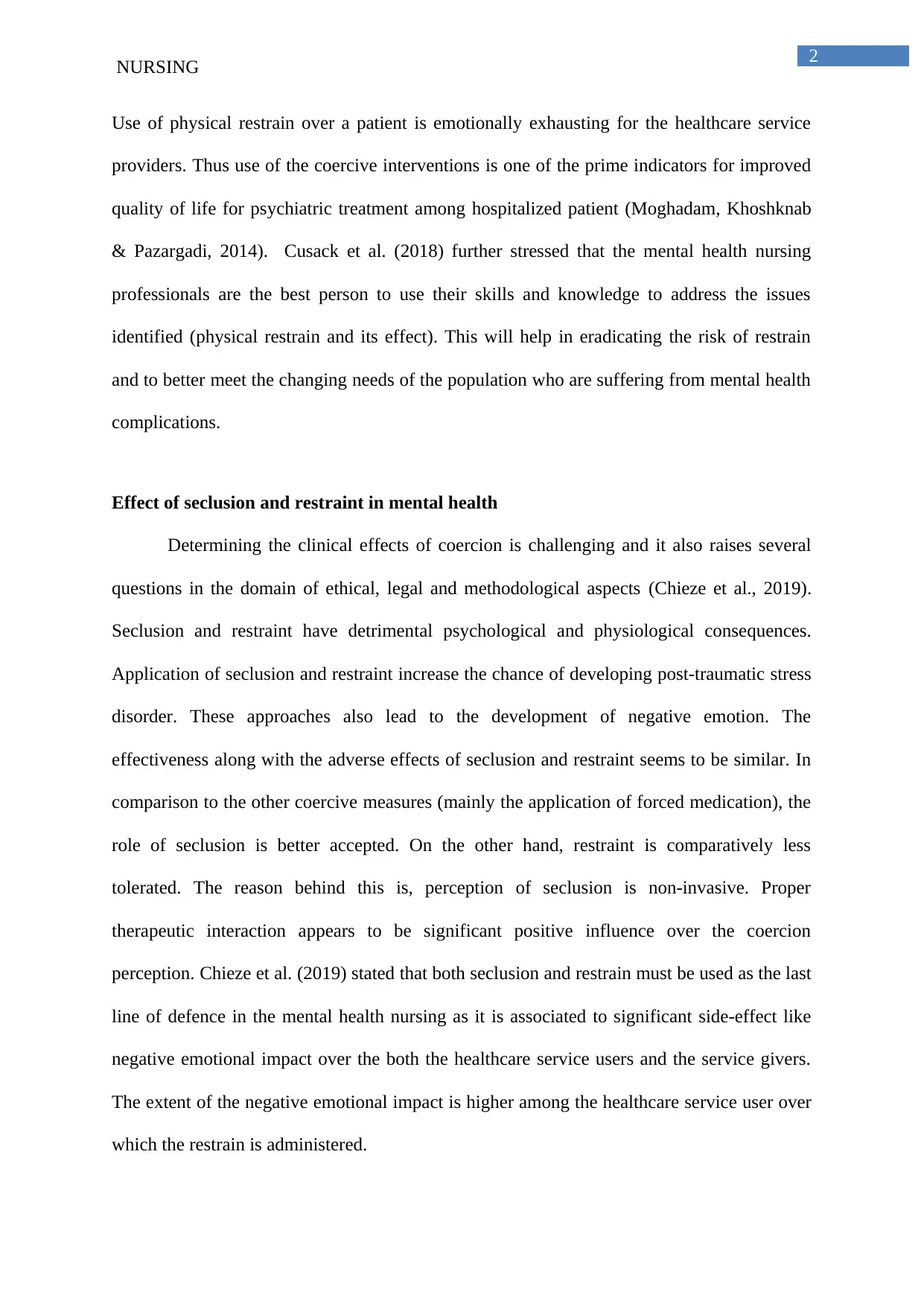
2
NURSING
Use of physical restrain over a patient is emotionally exhausting for the healthcare service
providers. Thus use of the coercive interventions is one of the prime indicators for improved
quality of life for psychiatric treatment among hospitalized patient (Moghadam, Khoshknab
& Pazargadi, 2014). Cusack et al. (2018) further stressed that the mental health nursing
professionals are the best person to use their skills and knowledge to address the issues
identified (physical restrain and its effect). This will help in eradicating the risk of restrain
and to better meet the changing needs of the population who are suffering from mental health
complications.
Effect of seclusion and restraint in mental health
Determining the clinical effects of coercion is challenging and it also raises several
questions in the domain of ethical, legal and methodological aspects (Chieze et al., 2019).
Seclusion and restraint have detrimental psychological and physiological consequences.
Application of seclusion and restraint increase the chance of developing post-traumatic stress
disorder. These approaches also lead to the development of negative emotion. The
effectiveness along with the adverse effects of seclusion and restraint seems to be similar. In
comparison to the other coercive measures (mainly the application of forced medication), the
role of seclusion is better accepted. On the other hand, restraint is comparatively less
tolerated. The reason behind this is, perception of seclusion is non-invasive. Proper
therapeutic interaction appears to be significant positive influence over the coercion
perception. Chieze et al. (2019) stated that both seclusion and restrain must be used as the last
line of defence in the mental health nursing as it is associated to significant side-effect like
negative emotional impact over the both the healthcare service users and the service givers.
The extent of the negative emotional impact is higher among the healthcare service user over
which the restrain is administered.
NURSING
Use of physical restrain over a patient is emotionally exhausting for the healthcare service
providers. Thus use of the coercive interventions is one of the prime indicators for improved
quality of life for psychiatric treatment among hospitalized patient (Moghadam, Khoshknab
& Pazargadi, 2014). Cusack et al. (2018) further stressed that the mental health nursing
professionals are the best person to use their skills and knowledge to address the issues
identified (physical restrain and its effect). This will help in eradicating the risk of restrain
and to better meet the changing needs of the population who are suffering from mental health
complications.
Effect of seclusion and restraint in mental health
Determining the clinical effects of coercion is challenging and it also raises several
questions in the domain of ethical, legal and methodological aspects (Chieze et al., 2019).
Seclusion and restraint have detrimental psychological and physiological consequences.
Application of seclusion and restraint increase the chance of developing post-traumatic stress
disorder. These approaches also lead to the development of negative emotion. The
effectiveness along with the adverse effects of seclusion and restraint seems to be similar. In
comparison to the other coercive measures (mainly the application of forced medication), the
role of seclusion is better accepted. On the other hand, restraint is comparatively less
tolerated. The reason behind this is, perception of seclusion is non-invasive. Proper
therapeutic interaction appears to be significant positive influence over the coercion
perception. Chieze et al. (2019) stated that both seclusion and restrain must be used as the last
line of defence in the mental health nursing as it is associated to significant side-effect like
negative emotional impact over the both the healthcare service users and the service givers.
The extent of the negative emotional impact is higher among the healthcare service user over
which the restrain is administered.
⊘ This is a preview!⊘
Do you want full access?
Subscribe today to unlock all pages.

Trusted by 1+ million students worldwide
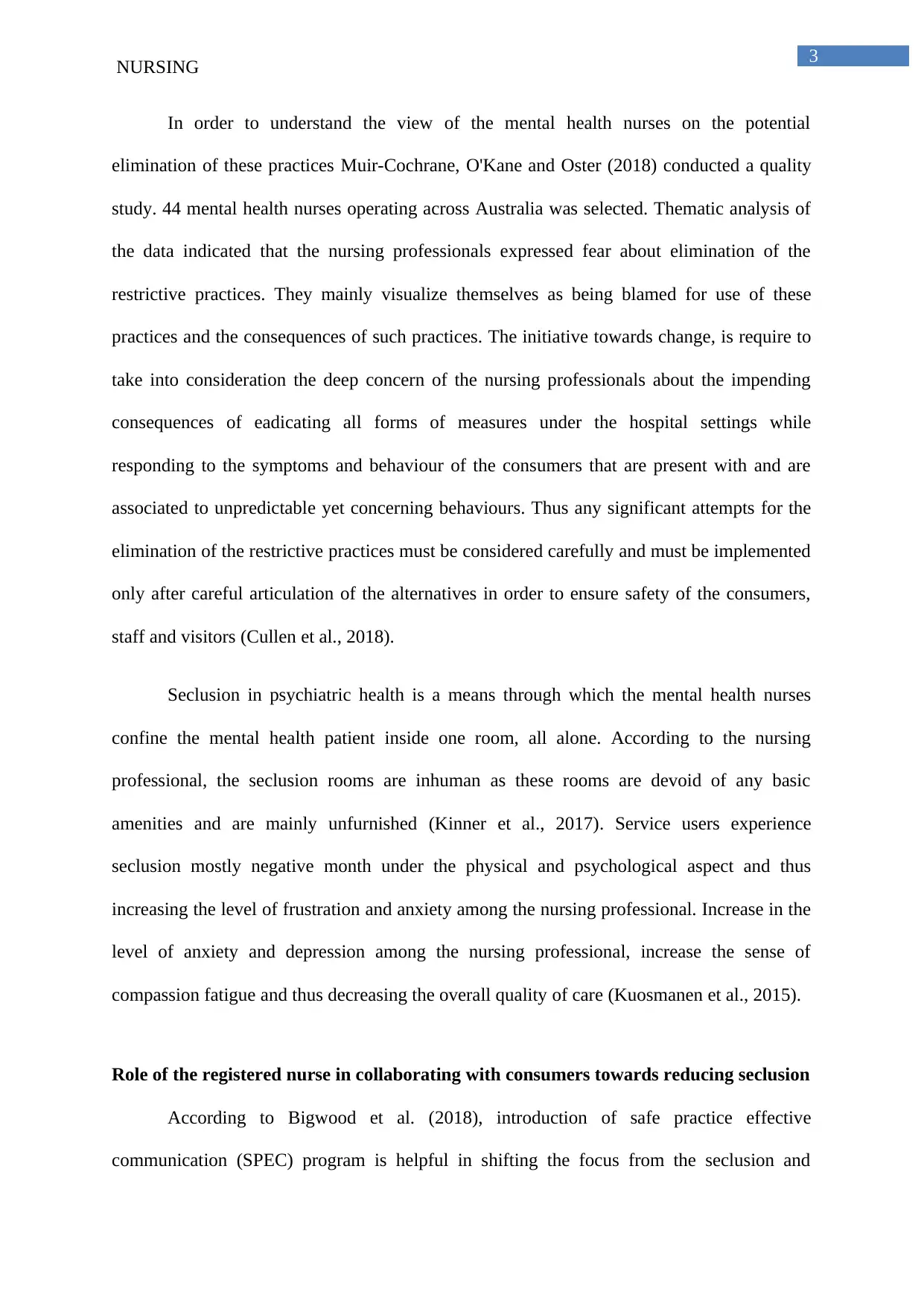
3
NURSING
In order to understand the view of the mental health nurses on the potential
elimination of these practices Muir‐Cochrane, O'Kane and Oster (2018) conducted a quality
study. 44 mental health nurses operating across Australia was selected. Thematic analysis of
the data indicated that the nursing professionals expressed fear about elimination of the
restrictive practices. They mainly visualize themselves as being blamed for use of these
practices and the consequences of such practices. The initiative towards change, is require to
take into consideration the deep concern of the nursing professionals about the impending
consequences of eadicating all forms of measures under the hospital settings while
responding to the symptoms and behaviour of the consumers that are present with and are
associated to unpredictable yet concerning behaviours. Thus any significant attempts for the
elimination of the restrictive practices must be considered carefully and must be implemented
only after careful articulation of the alternatives in order to ensure safety of the consumers,
staff and visitors (Cullen et al., 2018).
Seclusion in psychiatric health is a means through which the mental health nurses
confine the mental health patient inside one room, all alone. According to the nursing
professional, the seclusion rooms are inhuman as these rooms are devoid of any basic
amenities and are mainly unfurnished (Kinner et al., 2017). Service users experience
seclusion mostly negative month under the physical and psychological aspect and thus
increasing the level of frustration and anxiety among the nursing professional. Increase in the
level of anxiety and depression among the nursing professional, increase the sense of
compassion fatigue and thus decreasing the overall quality of care (Kuosmanen et al., 2015).
Role of the registered nurse in collaborating with consumers towards reducing seclusion
According to Bigwood et al. (2018), introduction of safe practice effective
communication (SPEC) program is helpful in shifting the focus from the seclusion and
NURSING
In order to understand the view of the mental health nurses on the potential
elimination of these practices Muir‐Cochrane, O'Kane and Oster (2018) conducted a quality
study. 44 mental health nurses operating across Australia was selected. Thematic analysis of
the data indicated that the nursing professionals expressed fear about elimination of the
restrictive practices. They mainly visualize themselves as being blamed for use of these
practices and the consequences of such practices. The initiative towards change, is require to
take into consideration the deep concern of the nursing professionals about the impending
consequences of eadicating all forms of measures under the hospital settings while
responding to the symptoms and behaviour of the consumers that are present with and are
associated to unpredictable yet concerning behaviours. Thus any significant attempts for the
elimination of the restrictive practices must be considered carefully and must be implemented
only after careful articulation of the alternatives in order to ensure safety of the consumers,
staff and visitors (Cullen et al., 2018).
Seclusion in psychiatric health is a means through which the mental health nurses
confine the mental health patient inside one room, all alone. According to the nursing
professional, the seclusion rooms are inhuman as these rooms are devoid of any basic
amenities and are mainly unfurnished (Kinner et al., 2017). Service users experience
seclusion mostly negative month under the physical and psychological aspect and thus
increasing the level of frustration and anxiety among the nursing professional. Increase in the
level of anxiety and depression among the nursing professional, increase the sense of
compassion fatigue and thus decreasing the overall quality of care (Kuosmanen et al., 2015).
Role of the registered nurse in collaborating with consumers towards reducing seclusion
According to Bigwood et al. (2018), introduction of safe practice effective
communication (SPEC) program is helpful in shifting the focus from the seclusion and
Paraphrase This Document
Need a fresh take? Get an instant paraphrase of this document with our AI Paraphraser
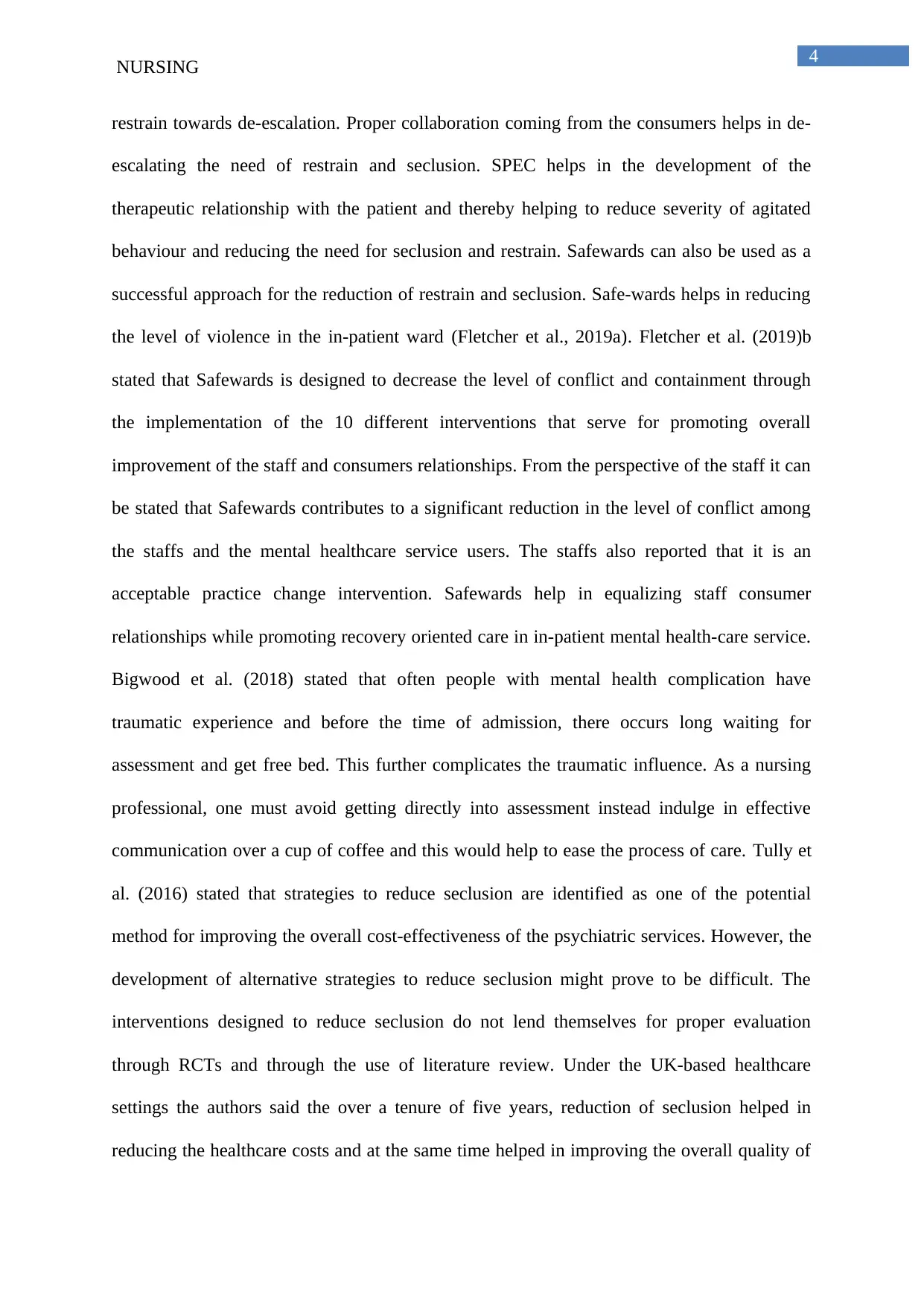
4
NURSING
restrain towards de-escalation. Proper collaboration coming from the consumers helps in de-
escalating the need of restrain and seclusion. SPEC helps in the development of the
therapeutic relationship with the patient and thereby helping to reduce severity of agitated
behaviour and reducing the need for seclusion and restrain. Safewards can also be used as a
successful approach for the reduction of restrain and seclusion. Safe-wards helps in reducing
the level of violence in the in-patient ward (Fletcher et al., 2019a). Fletcher et al. (2019)b
stated that Safewards is designed to decrease the level of conflict and containment through
the implementation of the 10 different interventions that serve for promoting overall
improvement of the staff and consumers relationships. From the perspective of the staff it can
be stated that Safewards contributes to a significant reduction in the level of conflict among
the staffs and the mental healthcare service users. The staffs also reported that it is an
acceptable practice change intervention. Safewards help in equalizing staff consumer
relationships while promoting recovery oriented care in in-patient mental health-care service.
Bigwood et al. (2018) stated that often people with mental health complication have
traumatic experience and before the time of admission, there occurs long waiting for
assessment and get free bed. This further complicates the traumatic influence. As a nursing
professional, one must avoid getting directly into assessment instead indulge in effective
communication over a cup of coffee and this would help to ease the process of care. Tully et
al. (2016) stated that strategies to reduce seclusion are identified as one of the potential
method for improving the overall cost-effectiveness of the psychiatric services. However, the
development of alternative strategies to reduce seclusion might prove to be difficult. The
interventions designed to reduce seclusion do not lend themselves for proper evaluation
through RCTs and through the use of literature review. Under the UK-based healthcare
settings the authors said the over a tenure of five years, reduction of seclusion helped in
reducing the healthcare costs and at the same time helped in improving the overall quality of
NURSING
restrain towards de-escalation. Proper collaboration coming from the consumers helps in de-
escalating the need of restrain and seclusion. SPEC helps in the development of the
therapeutic relationship with the patient and thereby helping to reduce severity of agitated
behaviour and reducing the need for seclusion and restrain. Safewards can also be used as a
successful approach for the reduction of restrain and seclusion. Safe-wards helps in reducing
the level of violence in the in-patient ward (Fletcher et al., 2019a). Fletcher et al. (2019)b
stated that Safewards is designed to decrease the level of conflict and containment through
the implementation of the 10 different interventions that serve for promoting overall
improvement of the staff and consumers relationships. From the perspective of the staff it can
be stated that Safewards contributes to a significant reduction in the level of conflict among
the staffs and the mental healthcare service users. The staffs also reported that it is an
acceptable practice change intervention. Safewards help in equalizing staff consumer
relationships while promoting recovery oriented care in in-patient mental health-care service.
Bigwood et al. (2018) stated that often people with mental health complication have
traumatic experience and before the time of admission, there occurs long waiting for
assessment and get free bed. This further complicates the traumatic influence. As a nursing
professional, one must avoid getting directly into assessment instead indulge in effective
communication over a cup of coffee and this would help to ease the process of care. Tully et
al. (2016) stated that strategies to reduce seclusion are identified as one of the potential
method for improving the overall cost-effectiveness of the psychiatric services. However, the
development of alternative strategies to reduce seclusion might prove to be difficult. The
interventions designed to reduce seclusion do not lend themselves for proper evaluation
through RCTs and through the use of literature review. Under the UK-based healthcare
settings the authors said the over a tenure of five years, reduction of seclusion helped in
reducing the healthcare costs and at the same time helped in improving the overall quality of
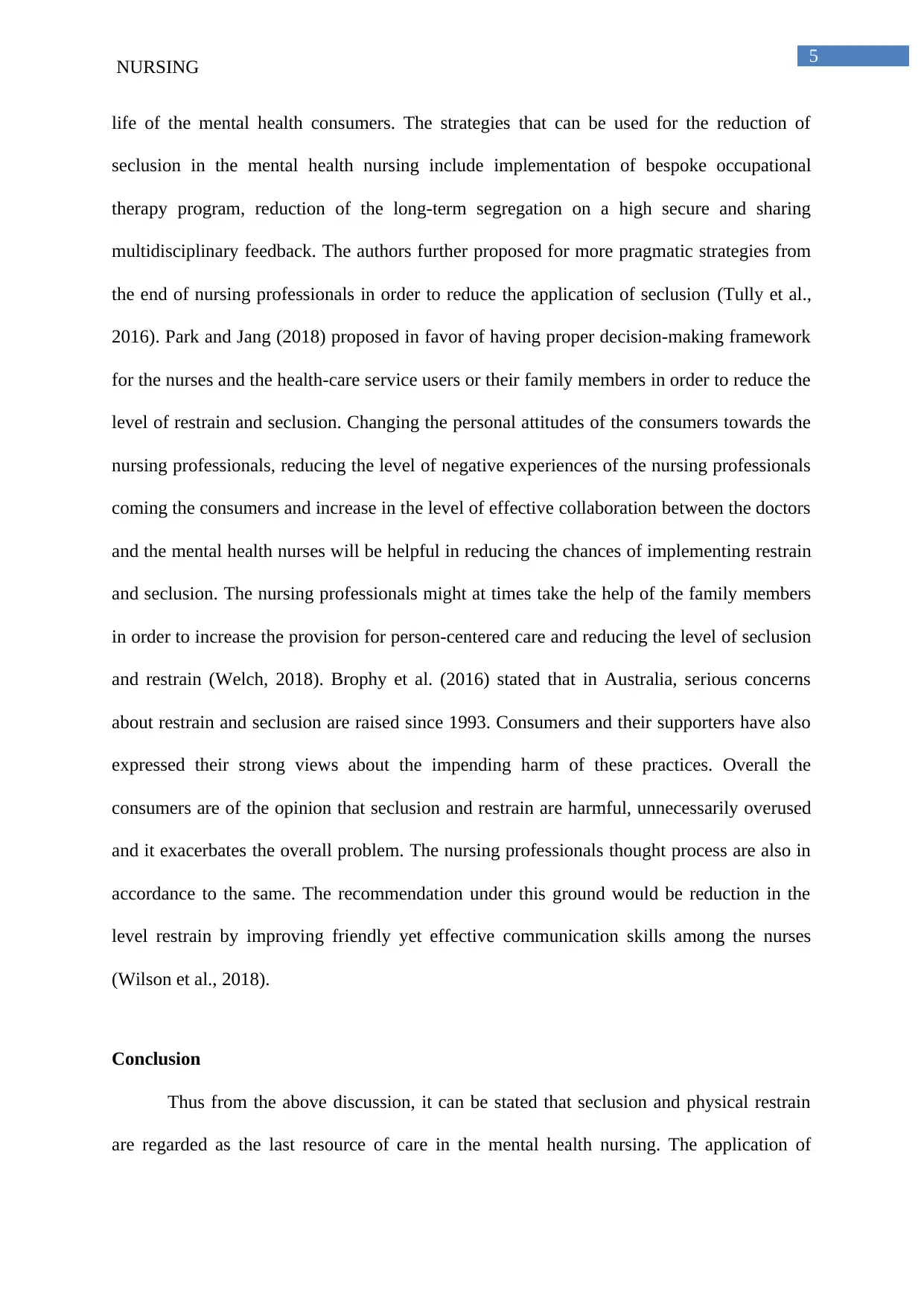
5
NURSING
life of the mental health consumers. The strategies that can be used for the reduction of
seclusion in the mental health nursing include implementation of bespoke occupational
therapy program, reduction of the long-term segregation on a high secure and sharing
multidisciplinary feedback. The authors further proposed for more pragmatic strategies from
the end of nursing professionals in order to reduce the application of seclusion (Tully et al.,
2016). Park and Jang (2018) proposed in favor of having proper decision-making framework
for the nurses and the health-care service users or their family members in order to reduce the
level of restrain and seclusion. Changing the personal attitudes of the consumers towards the
nursing professionals, reducing the level of negative experiences of the nursing professionals
coming the consumers and increase in the level of effective collaboration between the doctors
and the mental health nurses will be helpful in reducing the chances of implementing restrain
and seclusion. The nursing professionals might at times take the help of the family members
in order to increase the provision for person-centered care and reducing the level of seclusion
and restrain (Welch, 2018). Brophy et al. (2016) stated that in Australia, serious concerns
about restrain and seclusion are raised since 1993. Consumers and their supporters have also
expressed their strong views about the impending harm of these practices. Overall the
consumers are of the opinion that seclusion and restrain are harmful, unnecessarily overused
and it exacerbates the overall problem. The nursing professionals thought process are also in
accordance to the same. The recommendation under this ground would be reduction in the
level restrain by improving friendly yet effective communication skills among the nurses
(Wilson et al., 2018).
Conclusion
Thus from the above discussion, it can be stated that seclusion and physical restrain
are regarded as the last resource of care in the mental health nursing. The application of
NURSING
life of the mental health consumers. The strategies that can be used for the reduction of
seclusion in the mental health nursing include implementation of bespoke occupational
therapy program, reduction of the long-term segregation on a high secure and sharing
multidisciplinary feedback. The authors further proposed for more pragmatic strategies from
the end of nursing professionals in order to reduce the application of seclusion (Tully et al.,
2016). Park and Jang (2018) proposed in favor of having proper decision-making framework
for the nurses and the health-care service users or their family members in order to reduce the
level of restrain and seclusion. Changing the personal attitudes of the consumers towards the
nursing professionals, reducing the level of negative experiences of the nursing professionals
coming the consumers and increase in the level of effective collaboration between the doctors
and the mental health nurses will be helpful in reducing the chances of implementing restrain
and seclusion. The nursing professionals might at times take the help of the family members
in order to increase the provision for person-centered care and reducing the level of seclusion
and restrain (Welch, 2018). Brophy et al. (2016) stated that in Australia, serious concerns
about restrain and seclusion are raised since 1993. Consumers and their supporters have also
expressed their strong views about the impending harm of these practices. Overall the
consumers are of the opinion that seclusion and restrain are harmful, unnecessarily overused
and it exacerbates the overall problem. The nursing professionals thought process are also in
accordance to the same. The recommendation under this ground would be reduction in the
level restrain by improving friendly yet effective communication skills among the nurses
(Wilson et al., 2018).
Conclusion
Thus from the above discussion, it can be stated that seclusion and physical restrain
are regarded as the last resource of care in the mental health nursing. The application of
⊘ This is a preview!⊘
Do you want full access?
Subscribe today to unlock all pages.

Trusted by 1+ million students worldwide
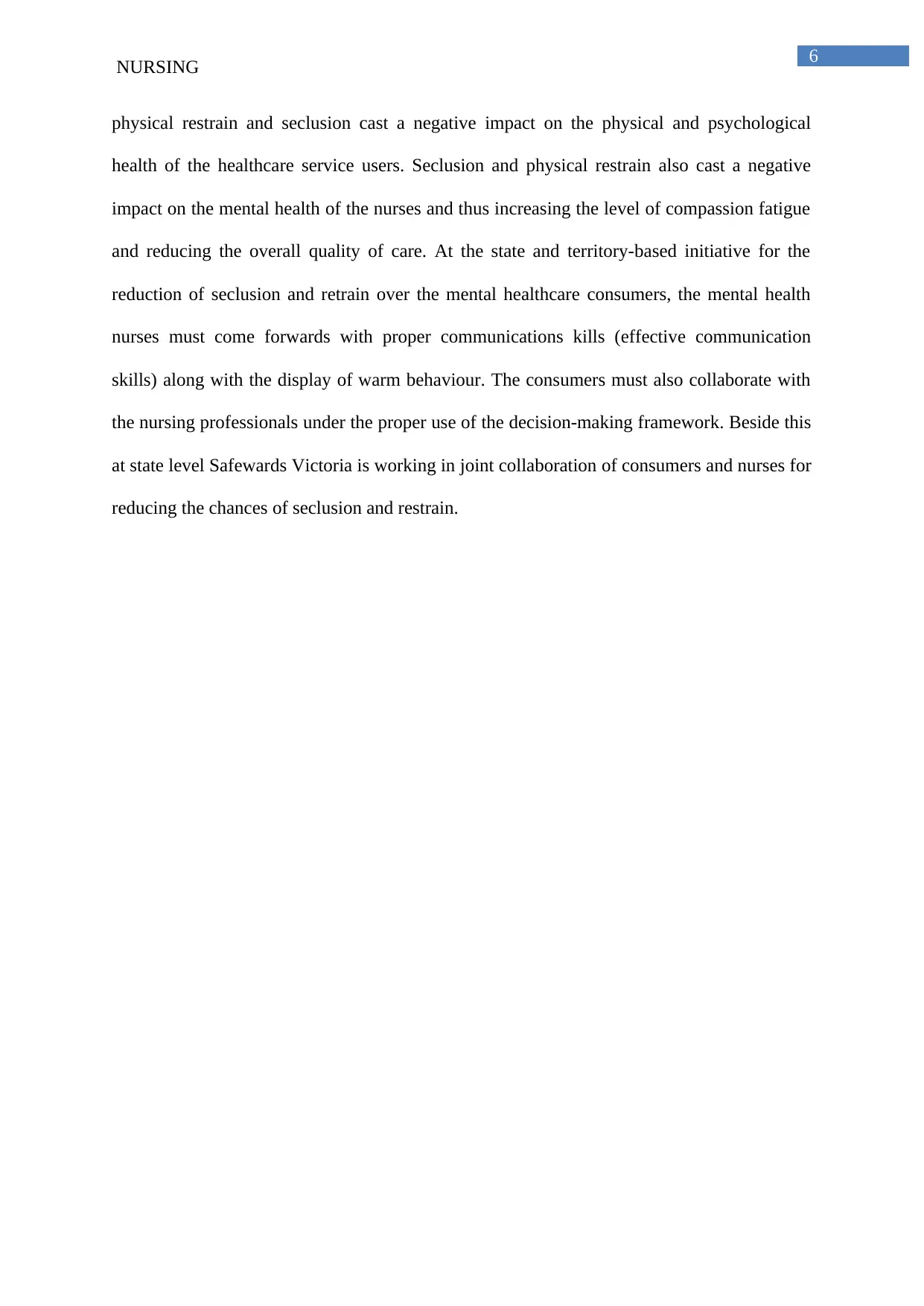
6
NURSING
physical restrain and seclusion cast a negative impact on the physical and psychological
health of the healthcare service users. Seclusion and physical restrain also cast a negative
impact on the mental health of the nurses and thus increasing the level of compassion fatigue
and reducing the overall quality of care. At the state and territory-based initiative for the
reduction of seclusion and retrain over the mental healthcare consumers, the mental health
nurses must come forwards with proper communications kills (effective communication
skills) along with the display of warm behaviour. The consumers must also collaborate with
the nursing professionals under the proper use of the decision-making framework. Beside this
at state level Safewards Victoria is working in joint collaboration of consumers and nurses for
reducing the chances of seclusion and restrain.
NURSING
physical restrain and seclusion cast a negative impact on the physical and psychological
health of the healthcare service users. Seclusion and physical restrain also cast a negative
impact on the mental health of the nurses and thus increasing the level of compassion fatigue
and reducing the overall quality of care. At the state and territory-based initiative for the
reduction of seclusion and retrain over the mental healthcare consumers, the mental health
nurses must come forwards with proper communications kills (effective communication
skills) along with the display of warm behaviour. The consumers must also collaborate with
the nursing professionals under the proper use of the decision-making framework. Beside this
at state level Safewards Victoria is working in joint collaboration of consumers and nurses for
reducing the chances of seclusion and restrain.
Paraphrase This Document
Need a fresh take? Get an instant paraphrase of this document with our AI Paraphraser
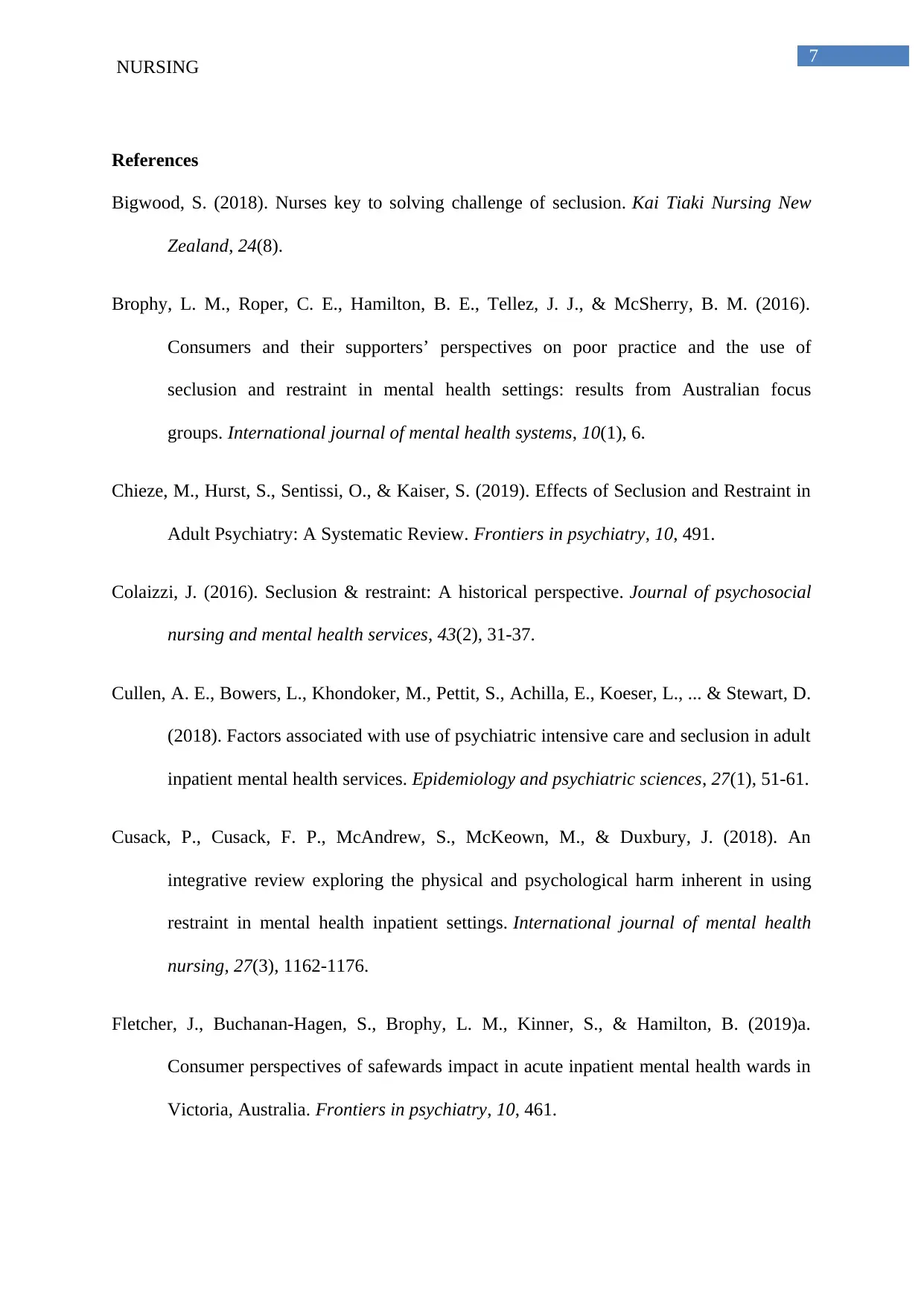
7
NURSING
References
Bigwood, S. (2018). Nurses key to solving challenge of seclusion. Kai Tiaki Nursing New
Zealand, 24(8).
Brophy, L. M., Roper, C. E., Hamilton, B. E., Tellez, J. J., & McSherry, B. M. (2016).
Consumers and their supporters’ perspectives on poor practice and the use of
seclusion and restraint in mental health settings: results from Australian focus
groups. International journal of mental health systems, 10(1), 6.
Chieze, M., Hurst, S., Sentissi, O., & Kaiser, S. (2019). Effects of Seclusion and Restraint in
Adult Psychiatry: A Systematic Review. Frontiers in psychiatry, 10, 491.
Colaizzi, J. (2016). Seclusion & restraint: A historical perspective. Journal of psychosocial
nursing and mental health services, 43(2), 31-37.
Cullen, A. E., Bowers, L., Khondoker, M., Pettit, S., Achilla, E., Koeser, L., ... & Stewart, D.
(2018). Factors associated with use of psychiatric intensive care and seclusion in adult
inpatient mental health services. Epidemiology and psychiatric sciences, 27(1), 51-61.
Cusack, P., Cusack, F. P., McAndrew, S., McKeown, M., & Duxbury, J. (2018). An
integrative review exploring the physical and psychological harm inherent in using
restraint in mental health inpatient settings. International journal of mental health
nursing, 27(3), 1162-1176.
Fletcher, J., Buchanan-Hagen, S., Brophy, L. M., Kinner, S., & Hamilton, B. (2019)a.
Consumer perspectives of safewards impact in acute inpatient mental health wards in
Victoria, Australia. Frontiers in psychiatry, 10, 461.
NURSING
References
Bigwood, S. (2018). Nurses key to solving challenge of seclusion. Kai Tiaki Nursing New
Zealand, 24(8).
Brophy, L. M., Roper, C. E., Hamilton, B. E., Tellez, J. J., & McSherry, B. M. (2016).
Consumers and their supporters’ perspectives on poor practice and the use of
seclusion and restraint in mental health settings: results from Australian focus
groups. International journal of mental health systems, 10(1), 6.
Chieze, M., Hurst, S., Sentissi, O., & Kaiser, S. (2019). Effects of Seclusion and Restraint in
Adult Psychiatry: A Systematic Review. Frontiers in psychiatry, 10, 491.
Colaizzi, J. (2016). Seclusion & restraint: A historical perspective. Journal of psychosocial
nursing and mental health services, 43(2), 31-37.
Cullen, A. E., Bowers, L., Khondoker, M., Pettit, S., Achilla, E., Koeser, L., ... & Stewart, D.
(2018). Factors associated with use of psychiatric intensive care and seclusion in adult
inpatient mental health services. Epidemiology and psychiatric sciences, 27(1), 51-61.
Cusack, P., Cusack, F. P., McAndrew, S., McKeown, M., & Duxbury, J. (2018). An
integrative review exploring the physical and psychological harm inherent in using
restraint in mental health inpatient settings. International journal of mental health
nursing, 27(3), 1162-1176.
Fletcher, J., Buchanan-Hagen, S., Brophy, L. M., Kinner, S., & Hamilton, B. (2019)a.
Consumer perspectives of safewards impact in acute inpatient mental health wards in
Victoria, Australia. Frontiers in psychiatry, 10, 461.
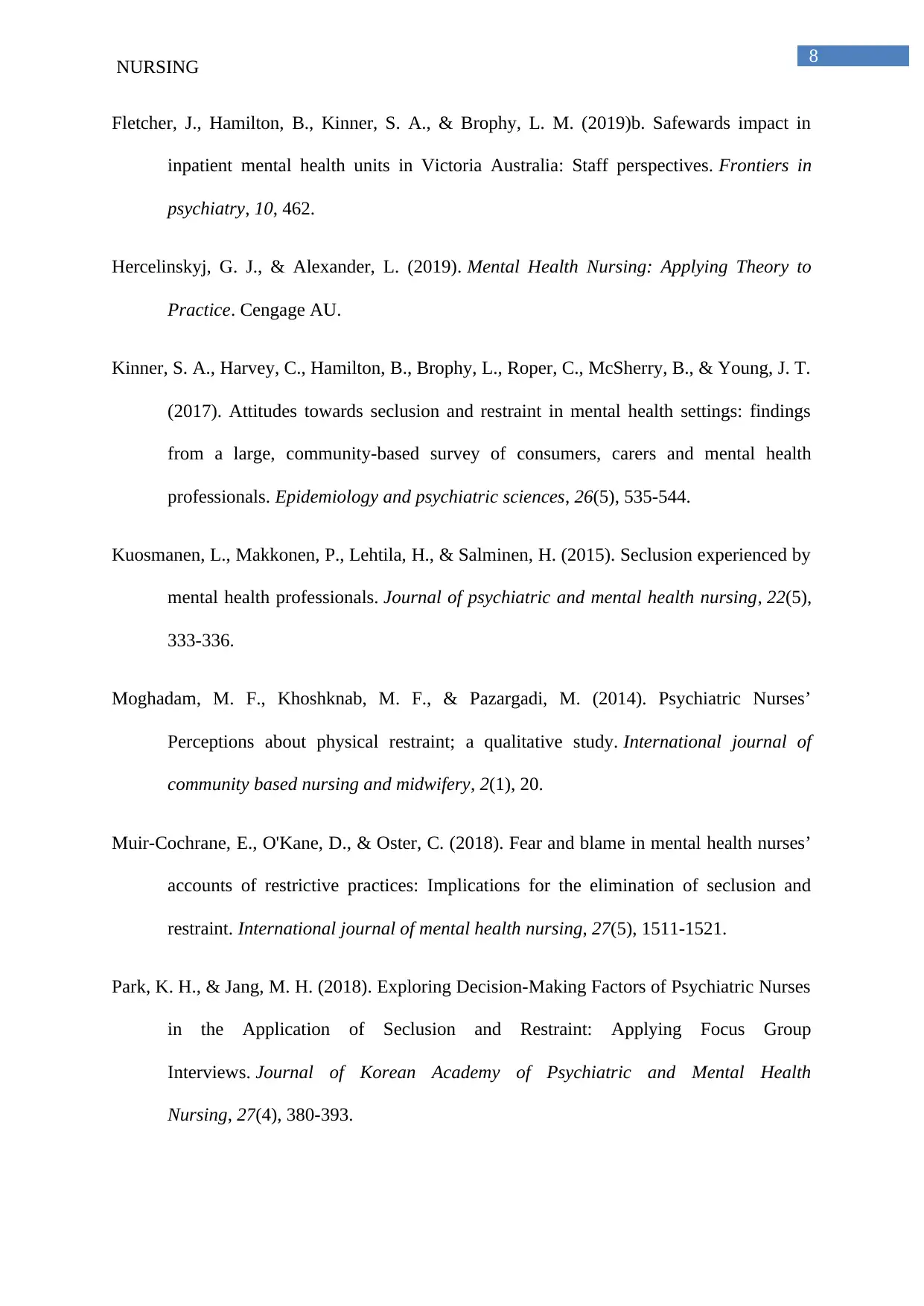
8
NURSING
Fletcher, J., Hamilton, B., Kinner, S. A., & Brophy, L. M. (2019)b. Safewards impact in
inpatient mental health units in Victoria Australia: Staff perspectives. Frontiers in
psychiatry, 10, 462.
Hercelinskyj, G. J., & Alexander, L. (2019). Mental Health Nursing: Applying Theory to
Practice. Cengage AU.
Kinner, S. A., Harvey, C., Hamilton, B., Brophy, L., Roper, C., McSherry, B., & Young, J. T.
(2017). Attitudes towards seclusion and restraint in mental health settings: findings
from a large, community-based survey of consumers, carers and mental health
professionals. Epidemiology and psychiatric sciences, 26(5), 535-544.
Kuosmanen, L., Makkonen, P., Lehtila, H., & Salminen, H. (2015). Seclusion experienced by
mental health professionals. Journal of psychiatric and mental health nursing, 22(5),
333-336.
Moghadam, M. F., Khoshknab, M. F., & Pazargadi, M. (2014). Psychiatric Nurses’
Perceptions about physical restraint; a qualitative study. International journal of
community based nursing and midwifery, 2(1), 20.
Muir‐Cochrane, E., O'Kane, D., & Oster, C. (2018). Fear and blame in mental health nurses’
accounts of restrictive practices: Implications for the elimination of seclusion and
restraint. International journal of mental health nursing, 27(5), 1511-1521.
Park, K. H., & Jang, M. H. (2018). Exploring Decision-Making Factors of Psychiatric Nurses
in the Application of Seclusion and Restraint: Applying Focus Group
Interviews. Journal of Korean Academy of Psychiatric and Mental Health
Nursing, 27(4), 380-393.
NURSING
Fletcher, J., Hamilton, B., Kinner, S. A., & Brophy, L. M. (2019)b. Safewards impact in
inpatient mental health units in Victoria Australia: Staff perspectives. Frontiers in
psychiatry, 10, 462.
Hercelinskyj, G. J., & Alexander, L. (2019). Mental Health Nursing: Applying Theory to
Practice. Cengage AU.
Kinner, S. A., Harvey, C., Hamilton, B., Brophy, L., Roper, C., McSherry, B., & Young, J. T.
(2017). Attitudes towards seclusion and restraint in mental health settings: findings
from a large, community-based survey of consumers, carers and mental health
professionals. Epidemiology and psychiatric sciences, 26(5), 535-544.
Kuosmanen, L., Makkonen, P., Lehtila, H., & Salminen, H. (2015). Seclusion experienced by
mental health professionals. Journal of psychiatric and mental health nursing, 22(5),
333-336.
Moghadam, M. F., Khoshknab, M. F., & Pazargadi, M. (2014). Psychiatric Nurses’
Perceptions about physical restraint; a qualitative study. International journal of
community based nursing and midwifery, 2(1), 20.
Muir‐Cochrane, E., O'Kane, D., & Oster, C. (2018). Fear and blame in mental health nurses’
accounts of restrictive practices: Implications for the elimination of seclusion and
restraint. International journal of mental health nursing, 27(5), 1511-1521.
Park, K. H., & Jang, M. H. (2018). Exploring Decision-Making Factors of Psychiatric Nurses
in the Application of Seclusion and Restraint: Applying Focus Group
Interviews. Journal of Korean Academy of Psychiatric and Mental Health
Nursing, 27(4), 380-393.
⊘ This is a preview!⊘
Do you want full access?
Subscribe today to unlock all pages.

Trusted by 1+ million students worldwide
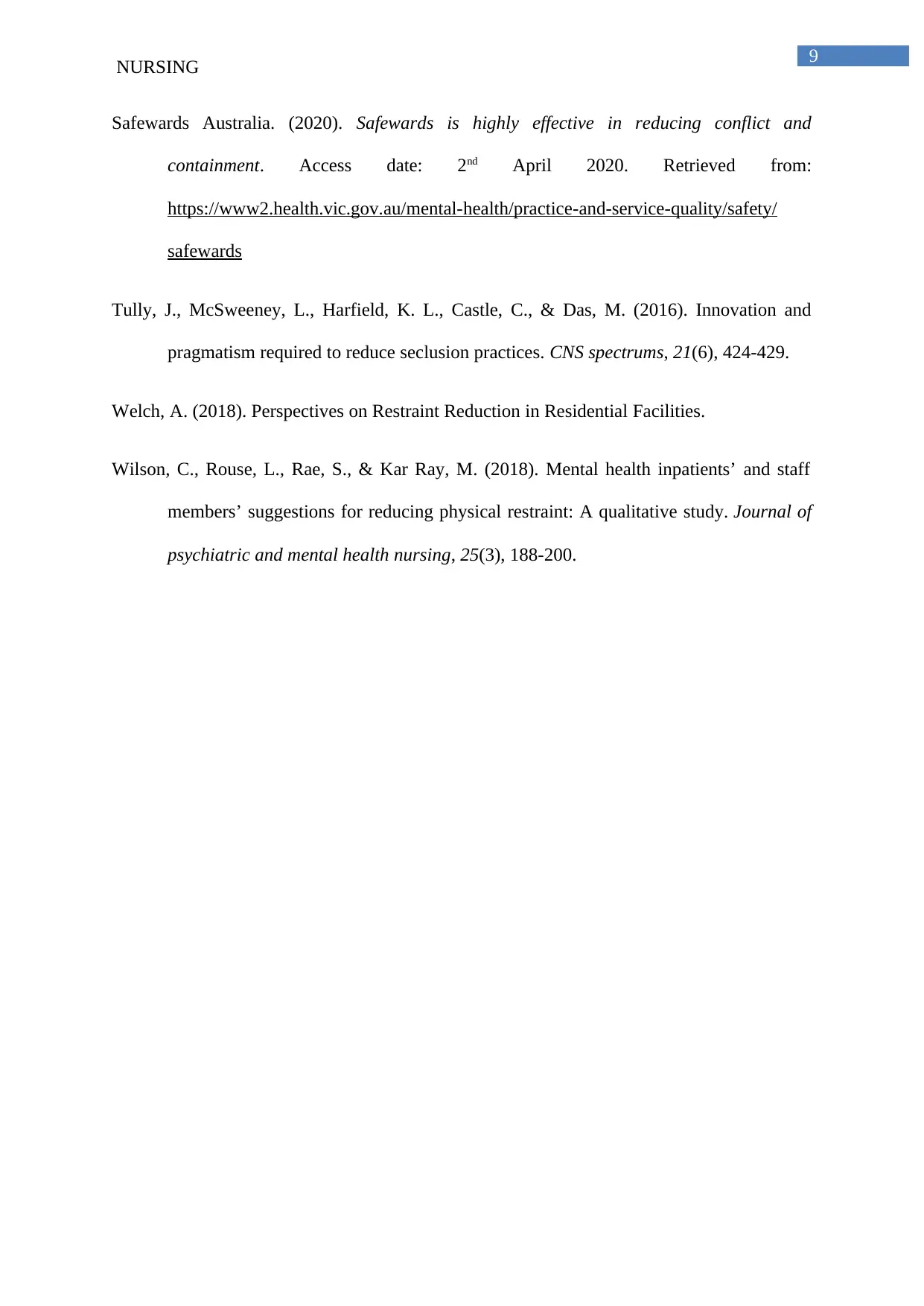
9
NURSING
Safewards Australia. (2020). Safewards is highly effective in reducing conflict and
containment. Access date: 2nd April 2020. Retrieved from:
https://www2.health.vic.gov.au/mental-health/practice-and-service-quality/safety/
safewards
Tully, J., McSweeney, L., Harfield, K. L., Castle, C., & Das, M. (2016). Innovation and
pragmatism required to reduce seclusion practices. CNS spectrums, 21(6), 424-429.
Welch, A. (2018). Perspectives on Restraint Reduction in Residential Facilities.
Wilson, C., Rouse, L., Rae, S., & Kar Ray, M. (2018). Mental health inpatients’ and staff
members’ suggestions for reducing physical restraint: A qualitative study. Journal of
psychiatric and mental health nursing, 25(3), 188-200.
NURSING
Safewards Australia. (2020). Safewards is highly effective in reducing conflict and
containment. Access date: 2nd April 2020. Retrieved from:
https://www2.health.vic.gov.au/mental-health/practice-and-service-quality/safety/
safewards
Tully, J., McSweeney, L., Harfield, K. L., Castle, C., & Das, M. (2016). Innovation and
pragmatism required to reduce seclusion practices. CNS spectrums, 21(6), 424-429.
Welch, A. (2018). Perspectives on Restraint Reduction in Residential Facilities.
Wilson, C., Rouse, L., Rae, S., & Kar Ray, M. (2018). Mental health inpatients’ and staff
members’ suggestions for reducing physical restraint: A qualitative study. Journal of
psychiatric and mental health nursing, 25(3), 188-200.
1 out of 10
Related Documents
Your All-in-One AI-Powered Toolkit for Academic Success.
+13062052269
info@desklib.com
Available 24*7 on WhatsApp / Email
![[object Object]](/_next/static/media/star-bottom.7253800d.svg)
Unlock your academic potential
Copyright © 2020–2026 A2Z Services. All Rights Reserved. Developed and managed by ZUCOL.





